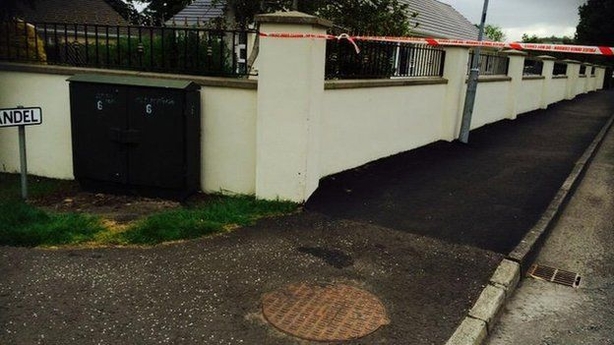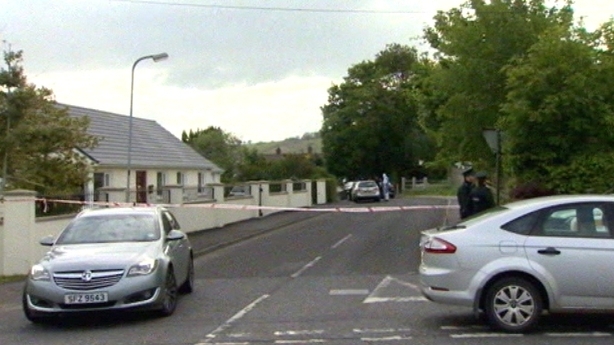A man convicted of a bid to kill a police officer has been jailed for 25 years.
Sean McVeigh, 38, from, Lurgan, Co Armagh, was found guilty in February of the attempted murder of a police officer at his home using an under-car bomb.
The bid was foiled when the officer's wife raised the alarm at their home in the Eglinton area of Co Derry in the early hours of 18 June 2015.
Police found a device containing 321g of semtex under the officer's car.
The non-jury trial at Belfast's Laganside Court was told that McVeigh had planted the bomb as part of a terrorist plot, involving at least three persons, using two cars that had been stolen in the Dublin area.
Judge Stephen Fowler described McVeigh as a "committed dissident republican terrorist" who had planted a device which had "one purpose, to kill anyone unfortunate enough to be in the car".
The judge said there were two potential victims, the police officer and his wife who is also a police officer.
He said it was "entirely fortuitous" that the planting of the bomb was disrupted and that both could have been in the car.
Judge Fowler added that given the car was parked in a residential area there could easily have been multiple deaths.
"I have no doubt this was a terrifying ordeal for both officers," Judge Fowler said.

PSNI detectives who worked on the case welcomed McVeigh’s sentencing, saying they were glad he was now "behind bars".
Detective Chief Inspector John Caldwell said: "Sean McVeigh chose to attack two officers who had selflessly chosen to protect their community and keep people safe despite the ever present threat posed by dissident republicans.
"I am thankful that despite Sean's evil intentions, he was unable to take these people away from their families and destroy numerous lives all in the name of his warped ideology.
"Today's success follows a rigorous investigation by detectives and I welcome the fact that Sean McVeigh is behind bars.
"His plan was to destroy lives and it demonstrates the ruthlessness and recklessness of those opposed to peace and who live for violence. Northern Ireland is a safer place with this terrorist removed from our streets."
McVeigh conviction follows cross-border cooperation
This may be the last example of pre-Brexit cross-border co-operation between the Gardai and the PSNI in their ongoing battle with dissident republican paramilitaries.
In the small hours of 18 June 2015 a woman woke up early in her family home in Eglington.
For some reason she was restless. She looked out her bedroom window and saw a skinny man putting something under one of two cars parked in the driveway. She was a serving police officer at the time; her partner was also in the PSNI.
She was so shocked that in wrapping hard on the bedroom window, she bruised her knuckles. She watched as "the skinny man" "legged it". She immediately alerted her police colleagues and three vehicles were dispatched to the scene.

Details of the incident were shared and in Derry city, 10km away, an on-duty PSNI officer was instructed to set up a checkpoint on the Foyle bridge.
As he and colleagues from another patrol vehicle set about doing so, they heard cars approaching from the Waterside.
The officer quickly realised that the cars were travelling at speed and had no intention of stopping so he stepped off the road.
The two cars had Republic of Ireland registrations and had been stolen in the Dublin area, two weeks before. One was found six days later, out of fuel, abandoned near Lifford in Co Donegal.
Gardaí were now joining the search for the would-be bombing team. An armed response unit, in pursuit of a car, blocked its path near the village of Killygordon. Inside were three occupants, the driver, McVeigh in the front passenger seat and a second passenger in the back seat.
In a follow-up search along the route taken by the car, gardaí found three pairs of Marigold-type gloves. Forensic tests would establish the gloves had traces of explosives residue on them.
RDX explosive traces were also found on McVeigh's black outer jacket and tracksuit bottoms. Further traces of RDK were also found on swabs taken from the front seat of the car, the interior door handles and from the rear seat.
McVeigh and the other two men were arrested after their car was stopped near Killygordon. He refused to answer questions and was subsequently granted bail.
Almost a year later, when he was back in Northern Ireland, he was arrested by PSNI detectives on a Lurgan-bound train and subsequently charged with attempted murder.
He was tried in a non-jury court and during it evidence was given that the device planted under the car in Eglington consisted of 321g of high-grade semtex.
The judge described it as "an elaborate one, carefully constructed to ensure maximum damage".
The parts included a mercury tilt switch and a copper cone that could penetrate the vehicle chassis.
The judge said he was sure the device was intended to kill anyone who was unfortunate enough to get inside the car and drive.
He concluded that he was satisfied beyond reasonable doubt that McVeigh had been the person who planted the device.
McVeigh is a 38-year-old joiner, with 36 previous convictions, some of them for road traffic offences, others for confrontations with the PSNI.
Additional reporting PA






